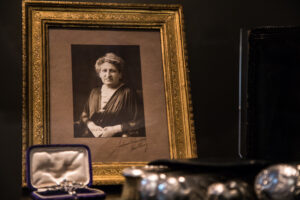
Women’s History Month — What We Can Learn from the Legacy of Aletta Jacobs
We have already celebrated International Women’s Day and are in the midst of Women’s History Month, so we at ESN wish you all a happy 8th of March and Women’s History Month. The world has made large leaps toward equality among genders, but we still have a long way to go. Part of this struggle is the protection of essential women’s rights, while we also fight for equality in the workplace, at home, and in every other sphere of life. The women studying in Groningen enjoy a lot of the liberties afforded to them by the efforts of the women who came before them. One of the primary figures of this movement was none other than Groningen’s own Aletta Jacobs (1854–1929).
Influenced by her father who was a physician Aletta Jacobs desired to become one herself. To this end, she became the first woman in the Netherlands to attain a high school diploma. Later on, she pushed the limits of Dutch society by becoming the first woman to attend a university (the RUG) and receive a medical degree in the country. Finally, she became the first woman to obtain a medical doctorate. Obtaining this education allowed her to break social barriers and served as the first step in her fight for women’s rights.

Throughout her career, she fought for the right of women to treat men. Using what she had learned during her studies, she helped working-class women and women from impoverished families develop modern and safe hygienic practices and childcare methods. She also advocated for pregnancy safety and popularized the use of contraceptives among women in a bid to curb the spread of sexually transmitted diseases and infant mortality in the country. Her struggles weren’t limited to the field of medicine alone. Aletta Jacobs also fought for women’s suffrage as she had an independent practice and paid taxes like any other man who could vote. She wrote articles arguing for the political and economic independence of women in the Netherlands. Her struggle continued to focus on working-class women and their labor rights, female sex workers and their safety, as well as the work conditions of both male and female nurses. Today, a whole 95 years after her death, Aletta Jacobs remains a shining example of progress in Groningen, symbolizing the universal rights of women and everyone to education, work, suffrage, and bodily autonomy.
However, as we promote the virtues of historical figures, we must also be aware of their shortcomings. Aletta Jacobs spent a good chunk of the early 20th century traveling the world. During her travels, she wrote letters in which she expressed inexcusable beliefs. While encountering people of different races on the African continent, she frequently dehumanized them and often compared them to animals or sub-human creatures. In South Africa, which was originally colonized by the Netherlands and then handed over to the British Empire, she claimed that the colonial subjects of the country were a step below them in evolution and clearly needed their assistance and support. Her racist views and colonial mindset showcase the failures of women’s history when it does not take into account the rights and freedoms of all women.
In conclusion, Aletta Jacobs was first and foremost a human, therefore a complex person who has done a lot to advance the position of women in society, but also a person who held deeply racist and outdated beliefs. What we can learn from her legacy is that the fight for women’s rights is far from over. Moreover, social equality cannot exist unless it transcends class, race, religion, ethnicity, sexuality, and gender.
~ Written by A. Heric